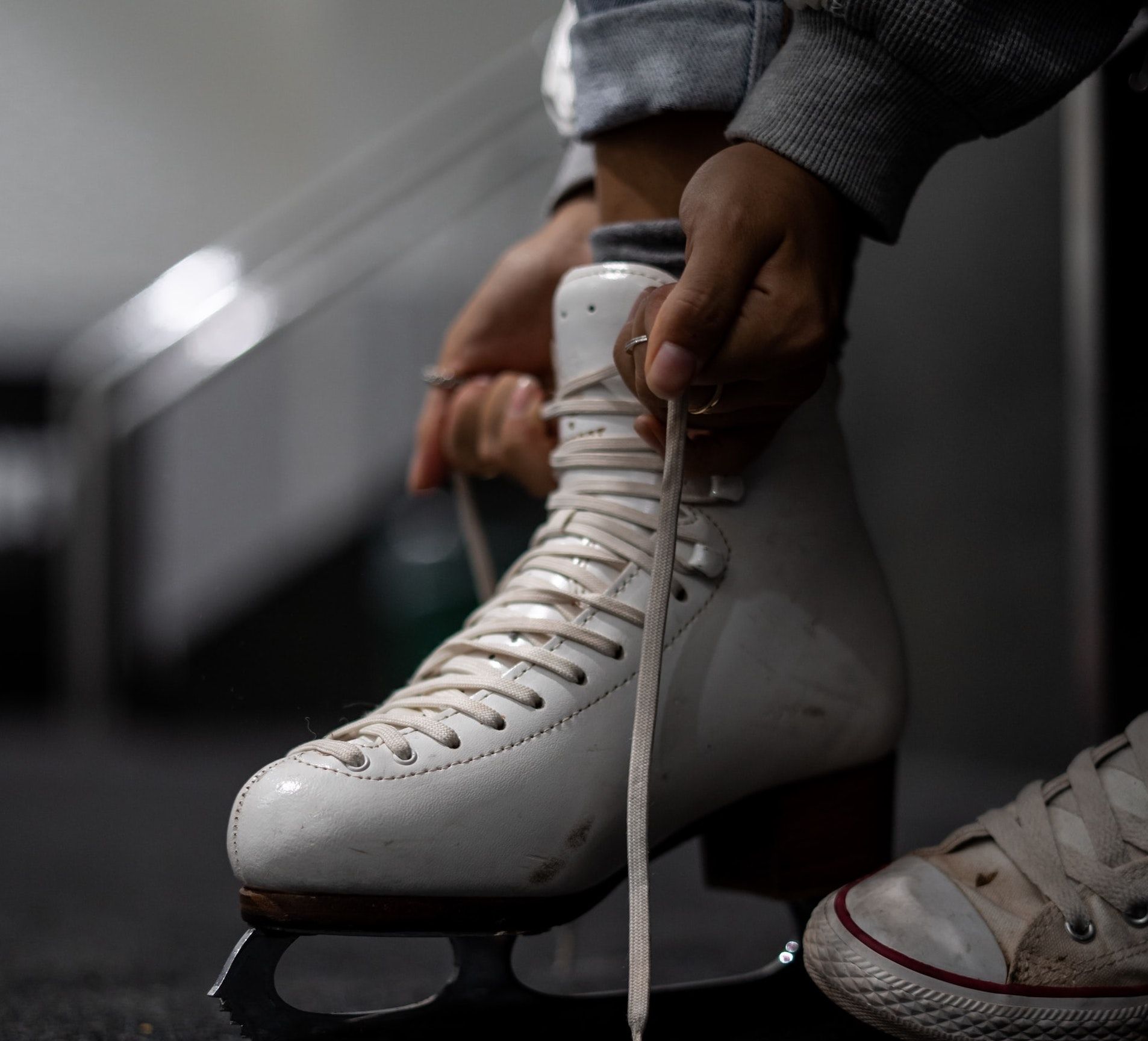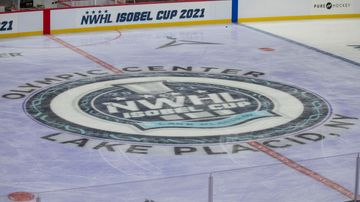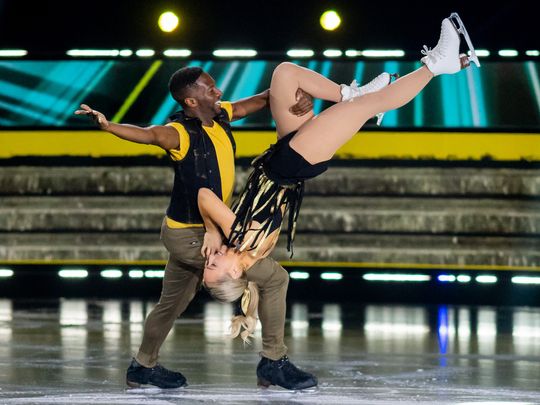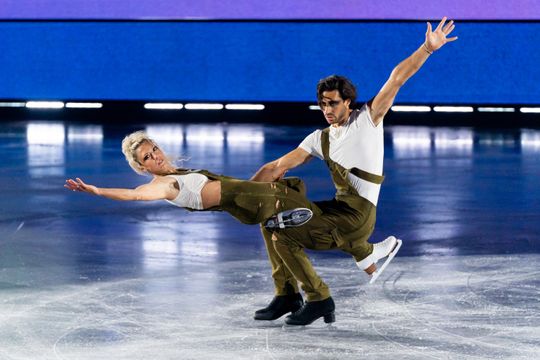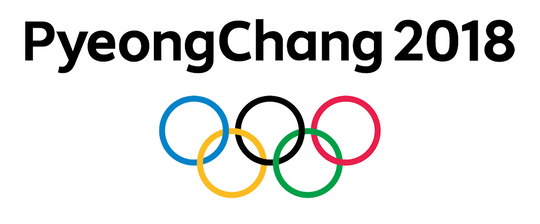As 2020's Black Lives Matter protests brought greater and wider attention to matters of systemic racism and injustice around the globe, cultural institutions reflected more broadly on their policies and practices around race, diversity, and inclusion. Athletes and sports organizations were often at the forefront of these conversations in the media. Many athletes took individual action, and leagues followed suit, creating diversity and inclusion initiatives that have had varying degrees of adoption and success.
In sports that are overwhelmingly white, the hill to climb towards true inclusivity is much higher and steeper. Figure skating is one such sport.
In the summer of 2020, a group of high-profile skaters decided to tackle this issue. "We were trying to figure out what were some of the actions we could take as a group to promote more diversity in skating," says Mariyah Gerber, co-founder and Vice President of the Figure Skating Diversity and Inclusion Alliance (FSDIA). Gerber is a professional pairs and show skater who has performed in many major shows including with Disney on Ice. The FSDIA also includes Olympians Vanessa James and Maé-Bérénice Méité, coach Michelle Hong, and Worlds competitor Elladj Balde.
Why is figure skating so white?
There are multiple factors affecting the class and race divisions in figure skating. One barrier to entry at all levels is the need to please individual judges. All types of competitive skating are judged by a panel of individuals, making the scoring uniquely subjective in comparison to most other sports. Judging panels are usually all-white and comprised of older members. "I think the biggest barrier for skaters of color is that [judges have] an idealistic skater in mind," says Gerber. This pre-conceived notion of the "perfect" skater is slim and white, someone who skates to classical music with balletic grace. The antiquated idea that figure skating is limited to this type of skater discourages rather than celebrates difference and diversity.
Surya Bonaly is a former French skater and current coach known for her tremendous technical ability and, famously, for the one-footed illegal backflip she landed at the 1998 Olympics. As a Black skater competing in the late eighties and nineties, she is still cited as a prominent example of how racism and figure skating conventions affect technical scoring. In the Netflix series Losers, Bonaly's partner Peter Biver (also a competitive skater and coach) recounted his feeling that she was often unfairly judged: "There's this notion of an ice princess which is a thin, white girl. Surya was breaking that tradition; she was outside of that box. She had something different to offer and I think it was hard for [the judges] to assign value to that and to measure that."
The type of racism that affects judging is part of a much wider problem, both on and off the ice. Systemic racism presents in unconscious bias and prejudice, in microaggressions and lack of cross-cultural understanding, and in inequality of access and opportunity. Bonaly was described by commentators and the media as "exotic", "mysterious", and an "unusual skater in every way." This is not uncommon, according to Stacia Brown, a writer and journalist, in Losers: "There's a lot of coded language that commentators use when they're discussing Black female athletes."
This constant othering contributes not only to making skating an unwelcoming, unsafe space for many skaters of color, but it also impacts how skaters approach their sport. In an interview with Michelle Hong, Gerber explains the unique position she found herself in as a Black show skater: "You're going to stand out anyway. You have that pressure of wanting to be better than good so you don't end up 'looking bad.'" Bonaly put it similarly in Losers: "As a Black athlete, I had to do more than 'good'; my job was to be impeccable."
It's not just judges that expect skaters to look and act a certain way; it's an expectation reinforced by teams, coaches, the media, and pop culture. Denise, a Black skater from the UK, shares how she's often picked out and told off for what she can only describe as "being Black and being myself" during team training. "It makes me feel like a clown," she says, and she recounts often crying after practice at the unfairness and embarrassment she feels. Saffron Williamson, a Black figure skater from London, points out the lack of people of color featured in skating movies as another signal that this sport is not a welcoming space for them.
Of course, racism also presents overtly. Mariyah Gerber was spat at as a young child at the rink by a white woman who "didn't want me to be there." Paulette Smart, a Black former professional skater and current coach in the UK, was laughed at as a child when she trained at the rink, confining herself to a quiet corner to stay out of everyone's way. Later, when she became a professional skater with Holiday on Ice, she was constantly picked on as being "Black and too fat" by the show's producers. She's had the police called on her multiple times whilst at work, and her son, also a skater, was once accosted after winning a competition by a coach making monkey noises at him.
Economic factors combine to keep the sport more accessible to white, upper-class competitors. The high cost of figure skating poses a barrier to entry for many skaters of color. Williamson lists the many expenses that she recognizes prevent people from low-income families from taking part: boots, coaching, training ice, transport to competitions and tests, and costumes and outfits for performances. Once at a high level, this all becomes "astronomically expensive," explains Gerber. "With finances being such a big barrier, it does mean that some skaters who are on that track will have to stop skating if they can't afford what's expected of a high-level competitor."
Tackling racism and growing diversity in skating
These material inequalities are something the FSDIA and other organizations are actively addressing, alongside tackling racism in rinks and improving diversity on the ice. Since being founded in the summer of 2020, the FSDIA has gained over 5,000 followers on their Instagram account where they showcase and celebrate Black skaters and skaters of color. They also host Conversations in Color, a video series where FSDIA founders and guests discuss their experiences in the skating world on YouTube, and run weekly community meetings for members to discuss issues they face at the rink and outside it.
One of the FSDIA's key aims is to foster a sense of community for skaters of color through connecting online, which Williamson believes is crucial: "There's a unique bond between skaters of color – not many of us skate, so when you find people that [do] with whom you share that experience, you just gel together." The FSDIA team have also kickstarted their Big Skater Little Skater mentorship program, and have so far matched three young people with experienced skaters. This will be a big focus for 2021, with hopes to expand the program and continue amplifying the talent of BIPOC skaters.
Joel Savary founded the Diversify Ice Foundation (DIFF) in 2016 with many of the same goals in mind. He's thrilled that there are now more organizations emerging to tackle racism in skating, something he says he noticed last year following the Black Lives Matter uprisings. Previously, many skaters felt like issues of racism had been dismissed by governing bodies, rinks, clubs and teams. The International Skating Union (ISU) released a short, vague statement in June 2020 expressing its commitment to opposing prejudice, but figure skating fans on social media noted the organization's noticeable silence on the specific issue of racism in skating and questioned the authenticity of such statements.
When Skate Canada released a statement in the aftermath of George Floyd's murder in May 2020 stating their support for inclusivity and opposition to racial injustice, Asher Hill, a Black Canadian skater, was incensed. On Twitter, Hill referenced complaints he had made about racism, homophobia, and misogyny spanning a five-year period that had been routinely ignored: "They pretty much abdicated their role in investigating them properly," he said in an interview with CBC. "Eventually [they] actually reprimanded me." Skate Canada denied this, but Hill has not retracted his allegation.
The FSDIA also released a response to Skate Canada's statement: "Although well-intentioned, to many skaters that identify as Black, these words did not reflect their personal experiences in the sport. When Skate Canada made this statement these words rang hollow and fell short in reflecting the past experiences of skaters who identify as BIPOC have had, not only at their respective figure skating clubs, but with Skate Canada and other NSOs [National Skating Organizations] personally."
The FSDIA created a Calls to Action document in response, which includes improving funding to support marginalized skaters and anti-discrimination education for coaches, judges and and board members, and sent it directly to Skate Canada. At the start of 2021, Skate Canada released its anti-racism education plan, a huge step in the right direction, though it is only encouraging rather than requiring members to participate. This shows just how crucial the work of organizations like DIFF and the FSDIA is; they have already affected change in an area that has been left largely unaddressed for decades.
US Figure Skating has at least attempted to publicly address material inequalities in the sport. They have a fund to support BIPOC skaters and have actively supported the work of the FSDIA and DIFF. For example, they've published a number of articles about the work of both organizations on their website, and have shared a video DIFF created featuring well known skaters pledging support for diversifying the sport. DIFF takes action on these pledges by fundraising to provide sponsorship to talented skaters who want to compete at a high level but would otherwise be restricted by the cost. In collaboration with governing bodies, they also work to educate judges and coaches about race, perception, and how unconscious bias affects their work.
There's another organization which has been in this space for a long time, but with a more localized focus. Figure Skating in Harlem combines academic education and skating training for Harlem's girls and young women of color. Founded in 1997, it has formed the basis of diversity and inclusion efforts in the skating world by directly and materially supporting and encouraging those who are underrepresented. The organization has been featured in Teen Vogue and ABC News, and has collaborated with Beyoncé's Ivy Park brand.
And one young skater connected with both the FSIDA and DIFF, Kaitlyn Saunders, was invited to perform at President Biden's virtual inauguration ceremony earlier this year.
As the visibility of Black skaters and skaters of color grows publicly, it's crucial that the skating world catches up internally, and that all levels of the sport begin reflecting diverse and inclusive participation and leadership. Many are hopeful that 2021 will mark that turning point in figure skating. Since co-founding the FSDIA, Gerber has noted a few significant successes of the organization. She's particularly proud of the FSDIA's mentorship program, the growth of their social media community, and the conversations that are starting to happen with governing bodies and rinks. "From where we started to where we are now it's been amazing to see the growth, see the potential, and to know that we are at such beginning stages [but already] starting to make an impact," she says.
She is clear, however, that there is still a lot of work to do. "It's going to take a shift from everybody – the people who are already in the rink, the people who make ads for the rink, federations, officials, judges – in order to make this change," she adds. "We are really trying to change what figure skating looks like and I can already see that happening, so I'm just proud and excited and I can't wait for what the future holds."
Quotes from Losers are from Season 1, Episode 3, titled Judgment.
(Photo: Kelli McClintock/Unsplash)
